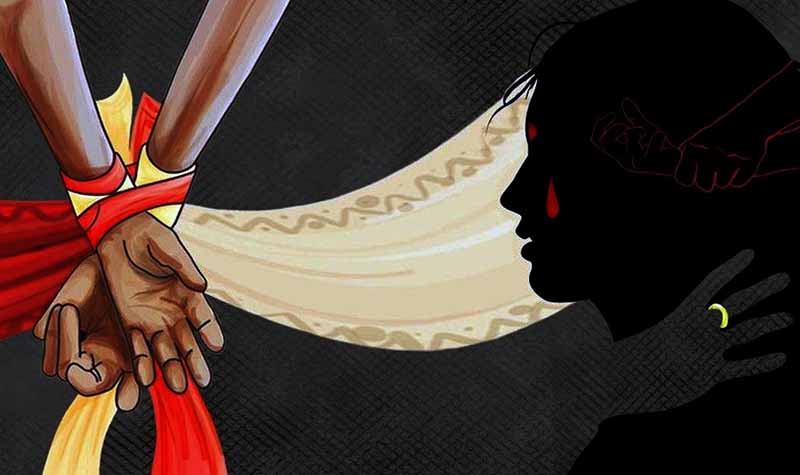Expediting Criminalisation Of Marital Rape
Feb 3, 2022 | Shalini Rai
Justice Divyesh Joshi observed that the actual incidences of violence against women in India are probably much higher than the data suggests and that women may continue to face hostility and remain in environments where they are subject to violence
In what is a shocking development but also a reflection of the dominant, overwhelmingly patriarchal strain of thought in our country, the Union government has told the Delhi High Court that just because other countries, mostly Western, have criminalised marital rape, it does not necessarily mean that India should “follow them blindly”.
Providing justification for its stance, the Centre, in its written submissions, has told the Delhi High Court that India has its own “unique problems due to various factors like literacy, lack of financial empowerment of the majority of females, mindset of the society, vast diversity, poverty etc and these should be considered carefully before criminalising marital rape.”
What this explanation by the government essentially means is that all the above-mentioned factors should assume primacy over a woman’s right to say no to sexual intercourse with her husband. As advocate Karuna Nundy has told the High Court, this provision places the institution of marriage above the rights of individuals and is therefore, unconstitutional.
The High Court is hearing a batch of petitions to remove Exception 2 in the rape law under Section 375 of the Indian Penal Code. The exception states that forcible sexual intercourse by a man with his wife is not rape, unless the wife is below 15 years of age. In effect, this exception decriminalises marital rape and mandates that sexual intercourse by a man with his own wife, the wife not being under fifteen years of age, is not rape.
The Law Commission of India in its 172nd Report also considered the issue of marital rape, but chose to ignore the voices that demanded the deletion of Exception 2 to Section 375 IPC on the ground that “it may lead to excessive interference with (a) marital relationship” and may destroy the institution of marriage. For all intents and purposes, the Law Commission did not recommend the criminalisation of marital rape.
Consequently, this exception is unconstitutional, as it gives primacy to the institution of marriage over the rights of the individuals in the marriage, as pointed out by Nundy. “To grant immunity in situations when rights of individuals are (under) siege, is to obstruct the unfolding vision of the Constitution,” said Nundy, who is representing two petitioners, the RIT Foundation and the All India Democratic Women’s Association.
Examined threadbare, each of the conditions unique to Indian society, which the government has put forth as arguments against criminalisation of marital rape — ‘literacy’, ‘lack of financial empowerment of the majority of females’, ‘poverty’ — makes it even more binding upon the state to protect the rights of women who are illiterate, financially-disenfranchised and/or poor. Other factors like ‘mindset of the society’ and ‘vast diversity’ should serve to reinforce that protection will be accorded to women who face forced sexual intercourse (in other words ‘rape’) in a marriage.
However, the Union government, reiterating its stand of 2017, has stated that since there is a vast diversity in the cultures of various Indian states, it is essential to implead with state governments in order to find out their opinion in the matter and avoid any complications at a later stage.
The Centre’s contention also raises the spectre of ‘Western’ influence on Indian jurisprudence and legalese, effectively saying that women in two different countries — for instance the US and India — will have different reactions to the same act (forced sexual intercourse). This is highly objectionable and calls into question the universality of such offences and whether geographical boundaries and cultural norms should be allowed to dictate the process of formation and execution of legislation, encompassing, as in this case, such an egregious violation of sexual rights and personal autonomy.
Noteworthy here is a reference made by the Justice (Retd.) JS Verma Committee to a decision of the European Commission of Human Rights that concluded that a rapist remains a “rapist regardless of his relationship with the victim”.
The issues at stake here go beyond the obvious ones of women’s sexual autonomy and the right to say no to sex. As pointed out by experts above, by arguing against criminalisation of marital rape, the government is by default making the primacy and supremacy of the act of sex more important than consent in a marriage.
And that is a red flag anywhere in the world, whether it is India or the so-called ‘Western’ nations, societal beliefs and practices of which our government seems so wary of being influenced by.
The need of the hour is to criminalise marital rape and do it as soon as legally possible. If there are two words that should never be mentioned together, they are marriage and rape. The commission of rape should nullify the bond of marriage between two individuals and make it a punishable offence and the time to do that is right now.
